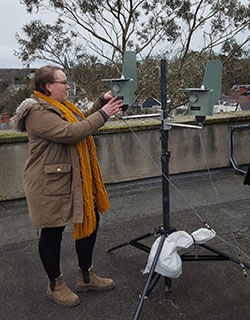Profile of Anna Egerton

- Name
- Anna Egerton
- Position
- MscRes Biological Sciences student
- afu206@bangor.ac.uk
- Phone
- Location
- Molecular Ecology and Evolution at Bangor
School of Natural Sciences
ECW Building, 3rd Floor,
Deiniol Road, Bangor, Gwynedd, LL57 2UW, UK
About
I am a Master by Research student, based in the Molecular Ecology and Evolution at Bangor (MEEB), Bangor University. I am interested in exploring new molecular techniques to sequence environmental DNA (eDNA) samples of air-borne tree pollen. I have recently been awarded the Professor John Harper Research Fund in Plant Ecology to help with the costs of my project: /news/professor-john-harper-research-fund-in-plant-ecology-awarded-to-msc-by-research-in-biological-sciences-student-anna-gwyneth-egerton-38196.
The project will form part of wider research being conducted by the Natural Environment Research Council (NERC) funded PollerGEN team in MEEB, in collaboration with Aberystwyth University, University of Exeter, University of Worcester, University of New South Wales (Sydney), the National Botanic Garden of Wales and the UK Met Office.
CV
Education
Bangor University - BSc (Hons) Environmental Conservation (2013 - 2017) – 2:1
Dissertation: “Differences in behavioural responses among sympatric ecomorphs of an East African cichlid fish (Astatotilapia sp.)”. The work involved carrying out filmed behavioural observations on wild-caught individuals, under laboratory conditions, to test for differences in behavioural phenotypes of two distinct ecomorphs: littoral and benthic. Each focal individual was introduced to male and female intruder stimuli fish, to measure the behavioural response in relation to territorial aggression and courtship behaviours.
Principal supervisor of project:
Prof George Turner (Bangor University)
Second supervisor of project:
Dr Alexandra Tyers (Bangor University)
Experience
The Fisheries Society of the British Isles (FSBI) – Internship (2017)
Research assistant for the project: “From morphology to microbiome: integrated common garden-genomic studies in Atlantic salmon (Salmo salar)”. The work was split between the Institute of Marine Research (IMR), Bergen, and MEEB, Bangor University. Duties included: Carrying out parentage analysis, to determine the genetic background of individuals from mixed tanks: farmed, wild or hybrid genotype; Assisting with library preparation for next-generation sequencing, to compare the microbiomes of the different genotypes.
Principal supervisor of project:
William Perry (PhD candidate) (Bangor University)
Second supervisors of project:
Prof Gary Carvalho (Bangor University)
Prof Si Creer
Other team members:
Angela Medina (MSc student) (Bangor University)
Research
Project title: “Aerobiological Sampling for DNA Sequencing: using the MinION to Identify Distinct Species of Allergenic Tree Pollen”.
One in five people are allergic to grass, tree or weed pollen, leading to health conditions such as hay fever (seasonal allergic rhinitis) and asthma, causing socio-economic problems. Identification of aerial pollen species, and their spatial-temporal information, may help to prevent and treat these conditions. Traditional pollen identification techniques use microscopy to observe unique morphological features; a process that can be labour intensive, time consuming and requires specialist training. Although suitable for identifying tree pollen at genus level, grass pollen grains do not have enough inter-genera variation for this method to be used. Recent advances in next-generation sequencing (NGS) have now been applied to identify allergenic grasses at genus level and are currently being used to identify trees. The MinION is a new, portable, real-time DNA sequencing device, which can be used in the laboratory or the field. This project will use the MinION to identify distinct species of allergenic tree pollen, by sequencing eDNA collected from multi-vial aerobiological samplers. Traditional microscopy identification techniques will also be carried out on tree pollen collected from sticky drum aerobiological samplers, at the same site, during the same sampling period. The results of the two methods will be compared to: 1) Assess the suitability of using the MinION as a sequencing tool for identifying tree pollen species from eDNA samples; 2) Determine any potential advantages of using the MinION alongside or instead of traditional pollen counts. It is hoped this research may be insightful to ecologists, palynologists, environmental epidemiologists and molecular biologists.
Principal supervisor of project:
Prof Si Creer (Bangor University)
Second supervisor of project:
Dr Alexander S. T. Papadopulos (Bangor University)
Other team members:
Dr Georgina Brennan (Post doc) (Bangor University)
Abdullah Munawa Rafiq (PhD candidate) (Bangor University)
